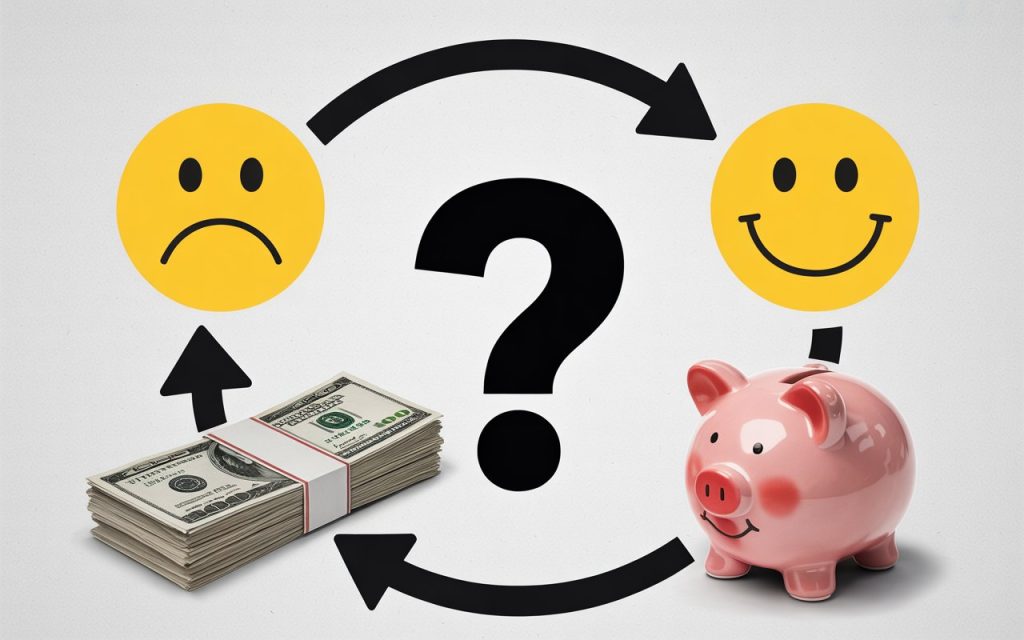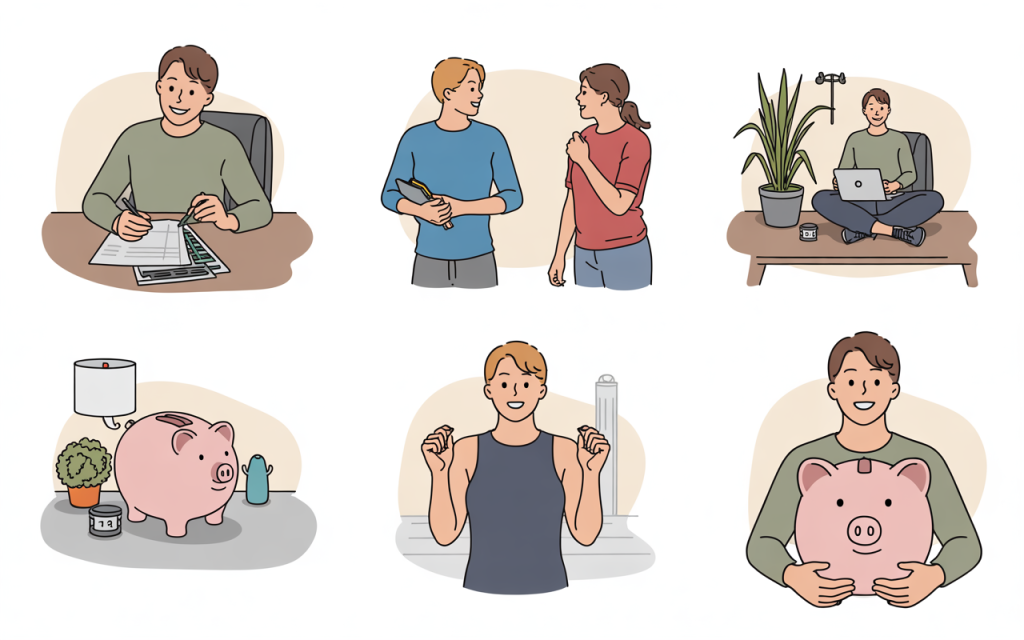Money & Mental Health: Discover the Powerful Connection
How Your Finances Shape Your Wellbeing—and What You Can Do About It

Money is something everyone thinks about every day. Whether you have a little or a lot, it affects how you feel and live. But did you know that money and mental health are closely linked? Many people do not realize just how much their money situation can impact their happiness, stress levels, and overall wellbeing. In this article, we will explore the powerful connection between money and mental health, and what you can do to make both better.
How Money Affects Your Mental Health
Let’s start by looking at how money affects your mind. When you have enough money, you feel safe and secure. You can pay your bills, buy food, and take care of your family. This makes you feel good and reduces stress. But when you do not have enough money, things can get tough. You might worry about how to pay for things, or feel guilty for not being able to provide for your loved ones. This can lead to anxiety, depression, and other mental health problems.
Research shows that people who struggle with money are more likely to feel stressed, anxious, or depressed. They may have trouble sleeping, feel tired all the time, or lose interest in things they used to enjoy. This is because money problems can take up a lot of mental space, making it hard to focus on anything else.

The Stress of Money Problems
One of the biggest ways money affects mental health is through stress. Worrying about money can make you feel like you are always on edge. You might lie awake at night thinking about bills, or feel nervous every time you check your bank account. Over time, this stress can wear you down and make it hard to enjoy life.
Stress from money problems can also affect your body. You might get headaches, stomachaches, or feel tired all the time. Some people even develop serious health problems because of the constant worry about money. This is why it is so important to take care of both your money and your mind.

How Mental Health Affects Your Money
It is not just that money affects your mental health—your mental health can also affect your money. When you feel anxious or depressed, it can be hard to make good decisions about money. You might avoid looking at your bank account, ignore bills, or spend money on things you do not need just to feel better for a short time.
People with mental health problems sometimes find it hard to keep a job or manage their money well. They might miss work because they do not feel well, or struggle to stick to a budget. This can make money problems worse, which in turn makes mental health problems worse. It can become a cycle that is hard to break.
The Cycle of Money and Mental Health
This cycle is one reason why money and mental health are so connected. When you have money problems, your mental health suffers. When your mental health suffers, it can be harder to manage your money. This can make both problems worse over time.
For example, someone who loses their job might start to feel depressed. Because they feel depressed, they might not look for a new job right away. This can lead to more money problems, which can make the depression worse. Breaking this cycle is important for both your money and your mental health.

How to Improve Your Money and Mental Health
Now that we know how money and mental health are connected, let’s look at some ways to improve both. Even small changes can make a big difference.
1. Talk About Your Money Problems
One of the best things you can do is talk about your money problems with someone you trust. This could be a friend, family member, or professional. Talking about your worries can help you feel less alone and may give you new ideas for solving problems.
2. Make a Budget
Making a budget is a simple way to take control of your money. Write down how much money you have and how much you spend each month. This can help you see where your money is going and find ways to save.
3. Set Small Goals
Set small, realistic goals for your money. For example, try to save a little bit each week, or pay off a small debt. Reaching these goals can help you feel better about your money and boost your mental health.
4. Ask for Help
If you are struggling with money or mental health, do not be afraid to ask for help. There are many organizations and professionals who can help you manage your money or get support for your mental health.
5. Take Care of Yourself
Taking care of your mental health is just as important as taking care of your money. Try to get enough sleep, eat healthy foods, and make time for things you enjoy. This can help you feel better and make it easier to manage your money.

The Power of Money on Your Mind
Money has a powerful effect on your mind. When you feel secure about your money, you are more likely to feel happy and confident. When you are worried about money, it can be hard to focus on anything else. This is why it is so important to pay attention to both your money and your mental health.

Real-Life Stories: Money and Mental Health
Let’s look at some real-life examples of how money and mental health are connected.
Sarah lost her job and started to worry about how she would pay her bills. She felt anxious all the time and had trouble sleeping. After a few months, she started to feel depressed. She avoided looking at her bank account and stopped going out with friends. With the help of a counselor, Sarah learned to talk about her worries and make a plan for her money. Slowly, she started to feel better.
John had always struggled with anxiety. He found it hard to manage his money and often spent more than he had. This made his anxiety worse. With support from his family and a financial advisor, John learned to make a budget and set small goals. As he got better at managing his money, his anxiety started to improve.
The Role of Society and Money
Society also plays a big role in how money affects mental health. In many places, people are judged by how much money they have. This can make money problems feel even worse. It is important to remember that your worth is not measured by your money. Everyone deserves support and respect, no matter their financial situation.

How to Support Others with Money and Mental Health Problems
If someone you know is struggling with money or mental health, there are things you can do to help.
1. Listen Without Judgement
Let them talk about their worries without judging them. Sometimes, just listening can make a big difference.
2. Offer Practical Help
You can help them make a budget, look for resources, or go with them to appointments. Small acts of kindness can go a long way.
3. Encourage Them to Seek Help
Let them know it is okay to ask for help. Encourage them to talk to a professional or join a support group.

The Importance of Education About Money and Mental Health
Many people do not learn about the connection between money and mental health. This can make it hard to understand why they feel the way they do. Education about money and mental health can help people recognize problems early and get the support they need.
How to Build Healthy Money Habits
Building healthy money habits can help you feel more in control and reduce stress. Here are some tips:
1. Track Your Spending
Write down everything you spend for a month. This can help you see where your money goes and find ways to save.
2. Save for Emergencies
Try to save a little bit each month for emergencies. Even a small amount can help you feel more secure.
3. Avoid Debt When Possible
Try not to spend more than you have. If you do have debt, make a plan to pay it off slowly.
4. Reward Yourself
When you reach a money goal, reward yourself with something small. This can help you stay motivated.

The Connection Between Money and Self-Esteem
Money can also affect how you feel about yourself. When you have enough money, you may feel more confident. When you do not, you might feel ashamed or embarrassed. It is important to remember that your value is not based on your money. Everyone has strengths and worth, no matter their financial situation.
How to Talk to Kids About Money and Mental Health
It is important to teach children about money and mental health. Talking openly about money can help kids feel less anxious and more prepared for the future. Here are some tips:
1. Be Honest
Talk to kids about money in a way they can understand. Let them know it is okay to ask questions.
2. Teach Healthy Habits
Show kids how to save, spend wisely, and talk about their feelings.
3. Lead by Example
Kids learn by watching adults. Show them how you manage your money and take care of your mental health.
The Future of Money and Mental Health
As more people learn about the connection between money and mental health, there is hope for better support and understanding. Schools, workplaces, and communities can help by providing education and resources.

Breaking the Stigma
There is still a lot of stigma around both money problems and mental health. Many people feel ashamed to talk about their struggles. Breaking this stigma is important so that everyone feels comfortable seeking help.
The Power of Community
Community support can make a big difference for people struggling with money and mental health. Support groups, counseling, and financial education can help people feel less alone and more empowered.
Simple Steps to Improve Both Money and Mental Health
Here are some simple steps you can take to improve your money and your mental health:
1. Talk About Your Feelings
Do not keep your worries to yourself. Talking about your feelings can help you feel better.
2. Make a Plan
Make a plan for your money and your mental health. Set small goals and celebrate your progress.
3. Ask for Help
Do not be afraid to ask for help. There are many people and organizations ready to support you.
4. Take Care of Yourself
Make time for things you enjoy and take care of your body and mind.

The Big Picture: Money and Mental Health
Money and mental health are deeply connected. When you take care of one, you help the other. By understanding this connection, you can make better choices for yourself and your family.
The Importance of Self-Compassion
Be kind to yourself, especially when you are struggling with money or mental health. Everyone faces challenges, and it is okay to ask for help.
How to Stay Positive
Even when things are tough, try to stay positive. Focus on what you can control and take small steps forward. Over time, these small steps can lead to big changes.
The Role of Work and Money
Work is a big part of life for most people, and it is closely tied to money. Having a job can give you a sense of purpose and security. But losing a job or having problems at work can cause stress and anxiety.

How to Manage Money Stress at Work
If you feel stressed about money at work, here are some tips:
1. Talk to Your Manager
If you are struggling, talk to your manager or HR. They may be able to help you find resources or support.
2. Take Breaks
Take short breaks during the day to relax and clear your mind.
3. Focus on What You Can Control
Focus on the things you can change, and try not to worry about things you cannot control.
The Connection Between Money and Relationships
Money problems can also affect your relationships. Arguments about money are common in families and couples. Talking openly about money can help prevent misunderstandings and reduce stress.
How to Talk About Money with Your Partner
Here are some tips for talking about money with your partner:
1. Be Honest
Be honest about your money situation and your feelings.
2. Make a Plan Together
Make a budget and set goals together. This can help you work as a team.
3. Listen to Each Other
Listen to each other’s worries and ideas. This can help you find solutions together.

The Power of Small Changes
Even small changes can make a big difference in your money and mental health. Try to focus on what you can do today, and celebrate your progress.
The Importance of Hope
No matter how tough things are, there is always hope. With support and effort, you can improve your money and your mental health.
Final Thoughts
Money and mental health are more connected than you might think. By understanding this connection, you can take steps to improve both. Remember, you are not alone. Many people struggle with money and mental health, and there is help available. Take care of yourself, reach out for support, and keep moving forward. You deserve to feel safe, secure, and happy—both in your money and in your mind.




